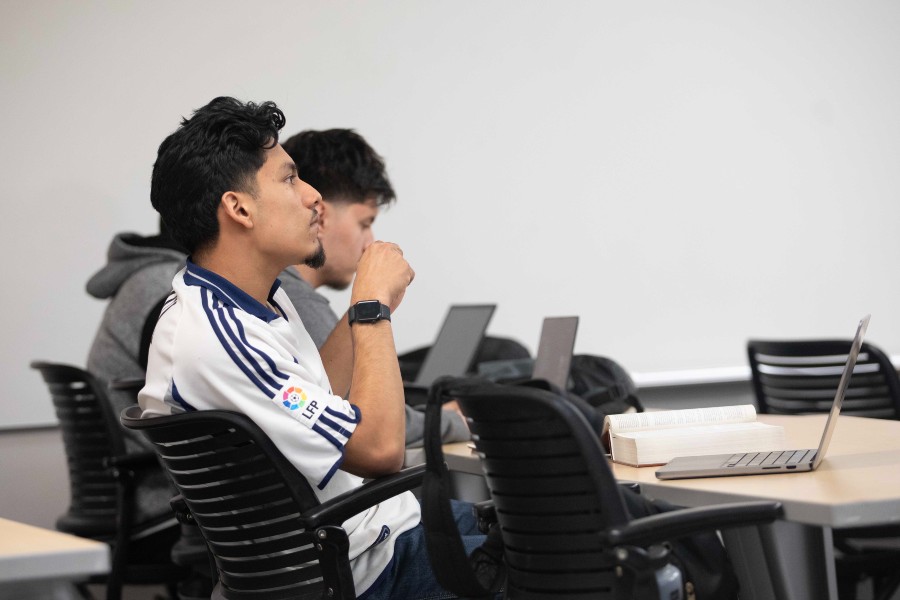New sections of required Bible courses offered in Spanish language
The optional Spanish course provides easier learning and a welcome environment for students whose spiritual upbringing was in Spanish.
Janel Shoun-Smith | 615-335-6273 |
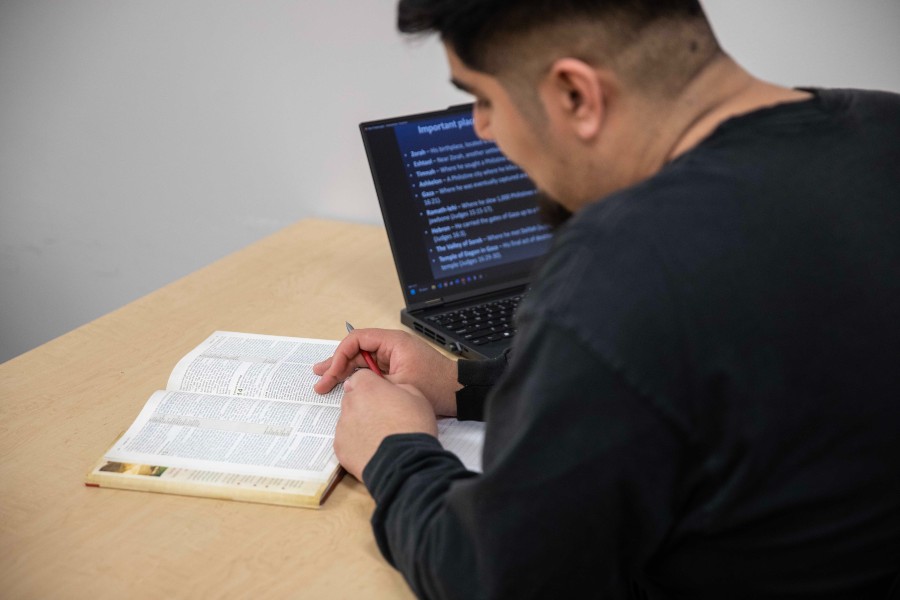
Ask any Lipscomb alum or current student and they will tell you that Bible courses are a cornerstone for carrying out Lipscomb’s Christ-centered mission.
In fact, in a recent spirituality survey of students they listed Bible classes as the university’s top spiritual life opportunity, and the impact of Bible faculty on the spiritual lives of our students rang through time and again.
So when J.P. Conway, assistant professor of Bible & Christian ministry and chair of undergraduate Bible studies, came across an idea that could enrich Lipscomb’s Bible courses for the university’s significant Hispanic student population, he jumped on it.
Not long after moving to Nashville with his wife, Lynette Austin, who became dean of the College of Health Sciences in 2023, Steve Austin met with Conway to talk about adjunct teaching. He threw out an idea: due to his years of experience in Hispanic ministry, he was capable of teaching Bible classes in Spanish for those students interested, especially those with a Hispanic background.
The idea took root, and fall 2024 brought the debut of the first Bible class taught in Spanish, which kicked off an initiative to offer Lipscomb’s entire core trio of Bible courses in Spanish, as well as a newly developed prerequisite course, Introduction to the Bible & Christianity, which was offered in Spanish and English this past fall.
Sixteen Spanish-speaking students enrolled this past fall in the voluntary Introduction to the Bible prerequisite, which will be counted toward their two required Bible elective courses. This spring, 15 of those students returned to take the Spanish-language section of The Story of Israel course, one of the three foundational Bible courses required of all Lipscomb students.
Students then have the option to continue as a voluntary cohort through the Spanish-language Story of Jesus and Story of the Church courses, which will be offered in 2025-2026.
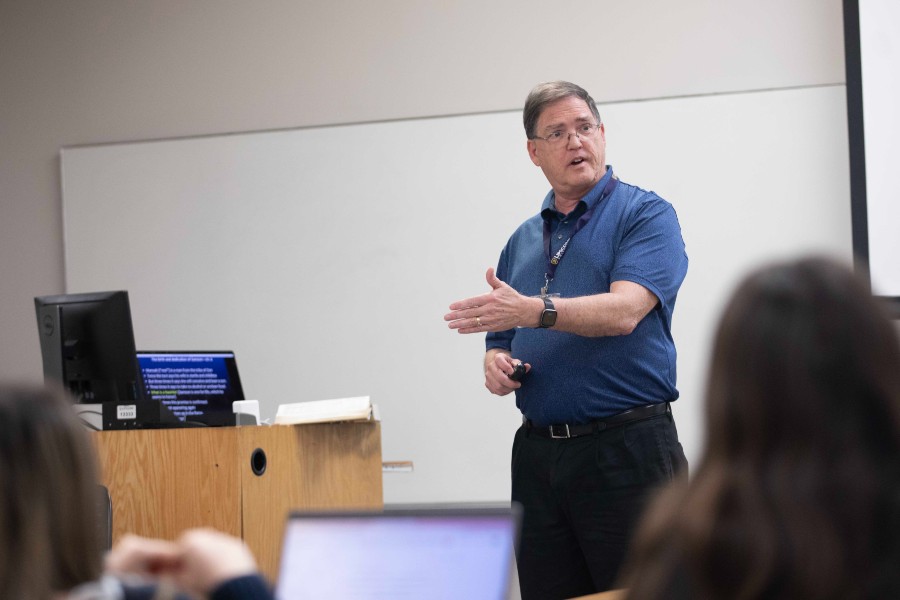
Adjunct instructor Steve Austin has spent a lifetime as a bilingual minister and educator.
The course teacher, Steve Austin, spent seven years in Argentina as a missionary and then worked at the Impact Church of Christ in Houston in their bilingual inner city ministry. In 2003, he began the Texas International Bible Institute in 2003 and has been the full-time director since 2005. The institute offers a certified undergraduate degree in Bible, and currently has 4,800 students around the globe in the Spanish language through remote learning courses.
Drawing on his lifetime of experience in bilingual ministry, Austin knew that many first and second generation children of immigrants learn about the Bible in Spanish. The names and places were pronounced in Spanish, potentially making it harder for them to recognize that information in English, he said.
“Many Latino students at Lipscomb report that they really enjoy Bible classes at Lipscomb but having only attended church in Spanish, they find themselves translating and hesitating in class as they hear names and scriptures that are familiar but different,” said Laura Delgado, a third-generation Cuban-American and program director for the Lipscomb Educator Scholars program in the College of Education.
Delgado works closely with education majors recruited from Nashville public schools and provided guidance for Conway and Austin as they were developing the courses.
“They often feel less confident at the outset speaking up in Bible class or sharing their ideas because they have never articulated them in English before,” she said of Lipscomb’s students raised speaking Spanish in their homes and with family.
For many Latino youth growing up in America, Spanish is their “heart language,” said Conway. “Heart language” is a term often used to describe the first language learned in childhood, the language that most deeply resonates emotionally and spiritually. Usually, it is the language that a person dreams in, thinks in and prays in.
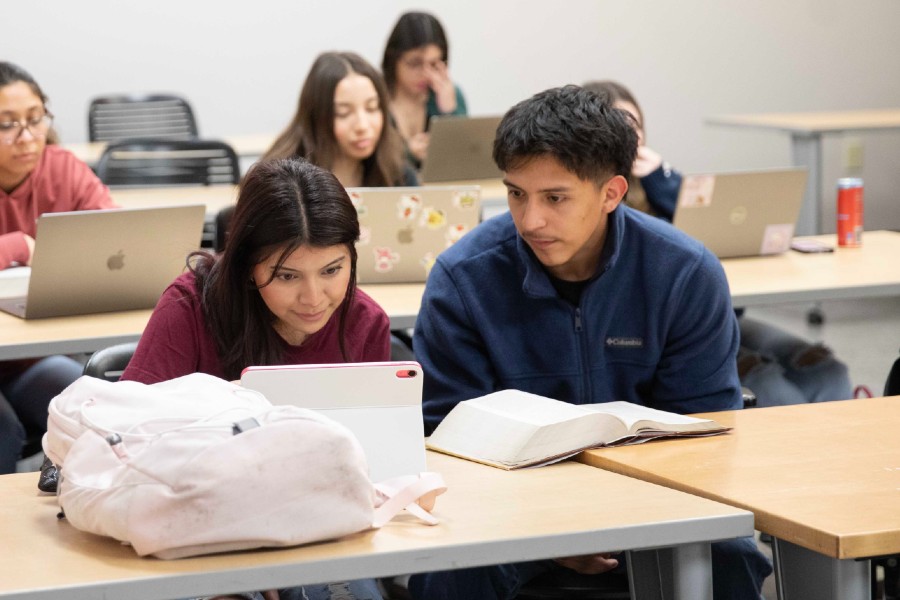
“There is an authentic, vulnerable side of ourselves, and we all talk differently when we are in that place,” said Conway. “When these youth get personal and intimate, Spanish is what comes out, even if they speak English. It’s likely they have always prayed in Spanish, their family gave them a Bible in Spanish, they sing hymns in Spanish.
“Our goal was to provide an option for youth who may speak Spanish as their heart language the ability to most effectively learn about Bible-based truths and living a Christ-centered life,” said Conway.
Because of university accreditation requirements, the bilingual students must take their tests in English, and through a mix of trial and error, Austin has discovered that the current students in the cohort prefer a mix of English and Spanish in the course.
In tandem with the core courses taught in Spanish, the university also debuted the Introduction to the Bible & Christianity course this past fall. The course is designed for students who have little familiarity with the Bible and is offered in English and Spanish.
The first of Lipscomb’s required freshman Bible courses, The Story of Israel, delves into complex matters, such as the Books of the Law, that students without a Christian background may find complex and overwhelming, said Conway. The prerequisite course introduces them to story arcs of the major characters of the Bible and explains basic Christian behaviors such as praying and singing and how churches are organized.
Both approaches allow students to study with other students with the same knowledge base or cultural background as their own, removing two common obstacles to students’ continuing and completing a Christian education.
The goal is for the courses to always be taught by adjunct faculty involved in local and global Hispanic ministry, and for students to proceed through them as a cohort, said Conway.
“Most of our Latino students are first-generation and these courses present a unique opportunity on Lipscomb's campus for a student to be in a class where every single person has more in common with them than they do different,” said Delgado. “This is one of the few places where Latino students can speak Spanish, hear Spanish and speak Spanglish. Their lived reality as a bilingual student is honored here.”
“It’s an investment in the students,” said Austin, “and in Lipscomb being a more diverse place where we all belong.”
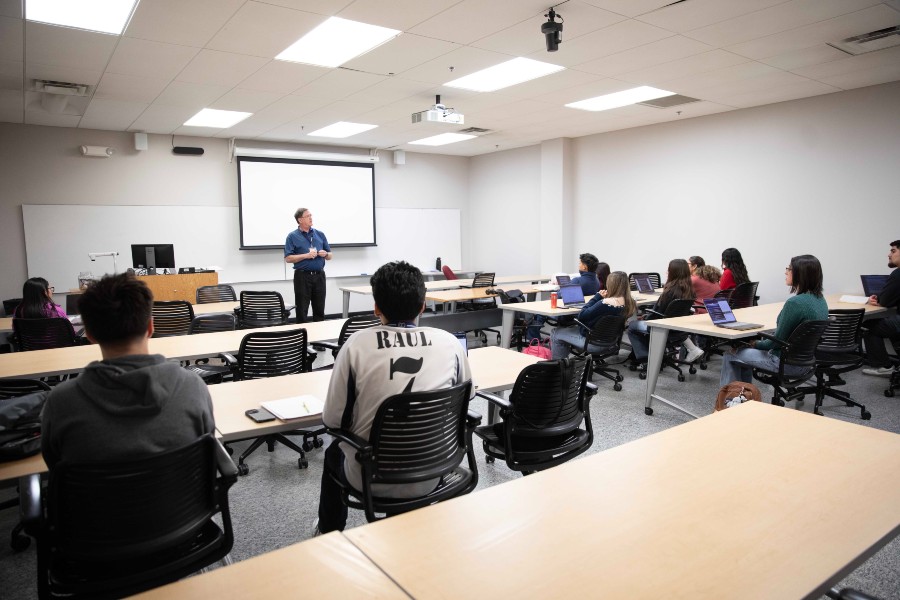
The students in the Story of Israel class said that they not only felt more comfortable being able to speak and hear Spanish in the class, but they also looked forward to practicing their bilingual skills and the small class size, providing more interaction, was appealing as well.
Student Jonathan Avendano said he appreciated the mixture of Spanish and English as he was not fully fluent in Spanish. So he actually learned more Spanish words through his class interaction.
That’s a skill that could serve him well in the future, said Austin, as bilingualism often opens up doors to more jobs and a better career.
Student Denise Castro said she was excited for a new experience and felt “I would get along with people more, and it would feel more comfortable being around similar people as myself who speak Spanish,” she said.
“I feel like if I learned it in English, I wouldn’t pay attention to it as much.”
Student Ariadna Chinchilla said that providing Bible courses, in particular, in Spanish, was meaningful because it allowed her to grow closer to the Bible professor as she had done with pastors at her church throughout her life. “If it were an English class, I wouldn’t feel like I could understand the Word as much,” she said, “being in a Spanish class just makes me feel more at home.”
In fall 2024, 19.3% of the freshman class and 10% of the entire student body self-identified as Hispanic.
